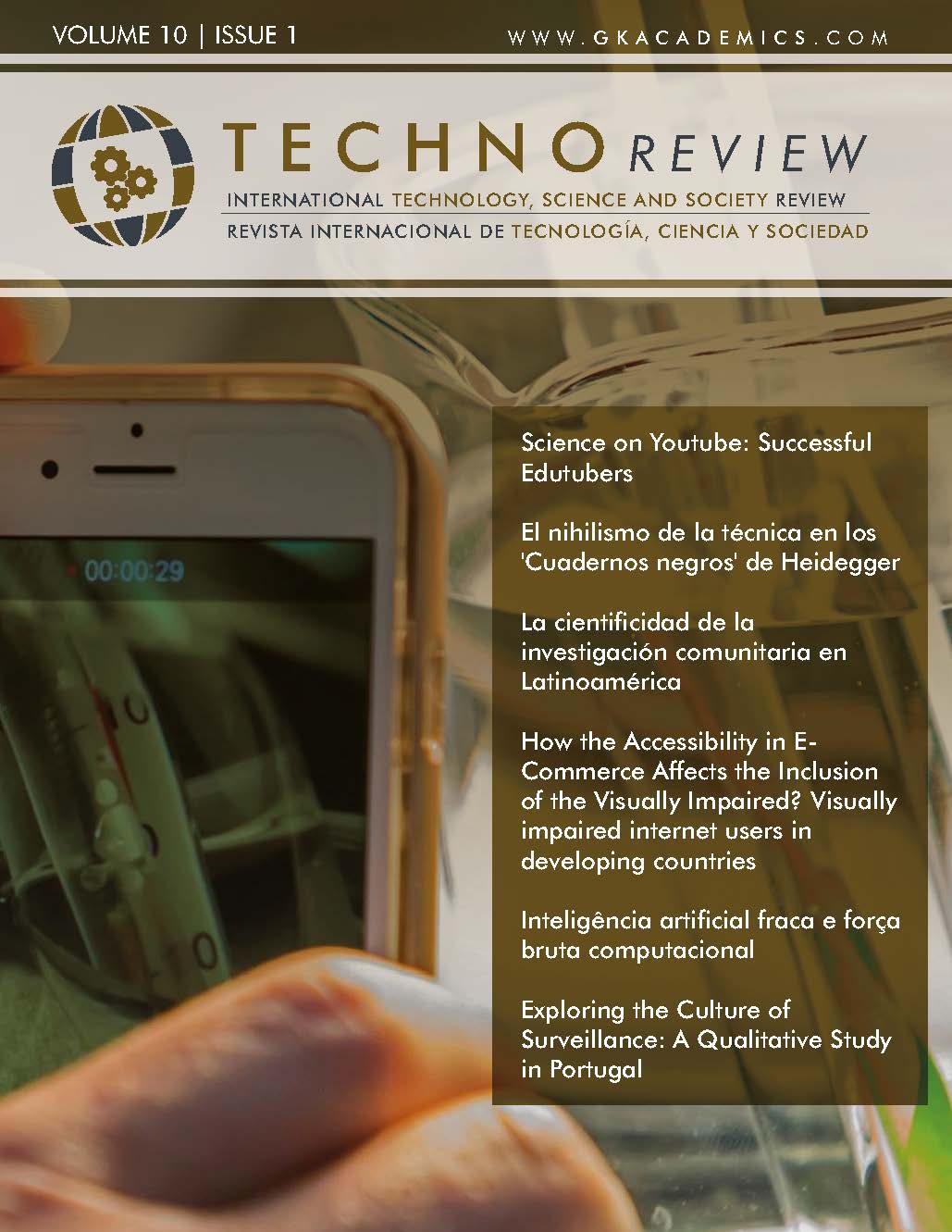Weak artificial intelligence and computational brute strength
DOI:
https://doi.org/10.37467/gka-revtechno.v10.2815Keywords:
Artificial intelligence (AI), Turing Univeral Machine (MUT), general artificial intelligence (IAG), GPT-3, cognition, hard problem, weak AI, strong AI, computer science, computational brute force, technology criticismAbstract
The purpose of this essay is to reflect critically on the current condition of our most modern artificial intelligence systems, their latent potentials, their technical possibilities, and also on their intrinsic structural and functional limitations. For this, we will take as an emblematic example of this time the new GPT-3 from OpenAI, which is a powerful specialist artificial intelligence system, therefore, a system designed and used according to the weak theory of AI, which is nothing more than a model of relatively complex artificial verbal language, structurally forged with 175 billion parameters and variables.
References
Aleksander, I.(2014). Machine consciousness: fact or fiction? In: Footnote: showcasing research with the power to change our world. Disponível em: . Acesso em: 17 ago. 2019.
Askell, A. (2020). GPT-3: Towards Renaissance Models. In Philosophers On GPT-3 (update with replies by GPT-3), DAILYNOUS: News Four and About the Philosopher Profession. Acesso em: 16/08/2020. Disponível em: <http://dailynous.com/2020/07/30/philosophers-gpt-3/>
Bostrom, N. (2018). Superinteligência: caminhos, perigos e estratégias para um novo mundo. DarkSide Books.
Buzsáki, G. (2006).Rhythms of the brain. Oxford University Press. DOI: https://doi.org/10.1093/acprof:oso/9780195301069.001.0001
Chalmers, D. (2020). GPT-3 and General Intelligence. In Philosophers On GPT-3 (update with replies by GPT-3), DAILYNOUS: News Four and About the Philosopher Profession. Acesso em: 16/08/2020. Disponível em: <http://dailynous.com/2020/07/30/philosophers-gpt-3/>
Changeux, J. y Connes, A. (1995). Matéria e pensamento. Editora UNESP.
Crevier, D. (1996). Inteligência artificial. Acento Editorial.
Shevlin, H. (2020). A Digital Remix of Humanity. In Philosophers On GPT-3 (update with replies by GPT-3), DAILYNOUS: News Four and About the Philosopher Profession. Acesso em: 16/08/2020. Disponível em: <http://dailynous.com/2020/07/30/philosophers-gpt-3/>
Goldin, D y Wegner, P. (2004). The origins of the Turing thesis myth. Technical Report CS04-14. Brown University. Disponível em: . Acesso em: 17 ago. 2019.
Haikonen, P. (2003). The cognitive approach to conscious machines. Imprint Academic.
Goldin, D y Wegner, P. (2007). Robot brains circuits and systems for conscious machines. Wiley.
Herbert A, S. (1992). O computador-rei. In: PESSIS-PASTERNAK, Guitta (org.). Do caos à inteligência artificial: quando os cientistas se interrogam, pp. 223-232.
Motemayor, C. (2020). Language and Intelligence. In Philosophers On GPT-3 (update with replies by GPT-3), DAILYNOUS: News Four and About the Philosopher Profession. Acesso em: 16/08/2020. Disponível em: <http://dailynous.com/2020/07/30/philosophers-gpt-3/>
Negrotti, M. (2012). From the natural brain to the artficial Mind. In: SWAN, Liz. (org.), Origins of mind, v. 8: biosemiotics, Drodrecht: Springer Science+Business Media, pp. 399-410. DOI: https://doi.org/10.1007/978-94-007-5419-5_21
Parnas, D. (2017). The real risks of artificial intelligence. Communications of ACM, 60(10). DOI: https://doi.org/10.1145/3132724
Quaresma, A. (2020). Inteligência artificial e bioevolução: Ensaio epistemológico sobre organismos e máquinas. Dissertação de Mestrado pelo programa de pós-graduação em Tecnologias da Inteligência e Design Digital (TIDD). Pontifícia Universidade Católica de São Paulo (PUC/SP).
Quaresma, A. (2020a). A falácia lúdica das três leis: Ensaio sobre inteligência artificial, sociedade e o difícil problema da consciência. In PAAKAT: Revista de Tecnología e Sociedad, número (no prelo). DOI: https://doi.org/10.32870/Pk.a10n19.478
Quaresma, A. (2019). Inteligências artificiais e o problema da consciência. In PAAKAT: Revista de Tecnología e Sociedad, 16(9). DOI: https://doi.org/10.32870/Pk.a9n16.349
Quaresma, A. (2018). Inteligências artificiais e os limites da computação. In PAAKAT: Revista de Tecnología e Sociedad, 15(8).
Rini, R. (2020). The Digital Zeitgeist Ponders Our Obsolescence. In Philosophers On GPT-3 (update with replies by GPT-3), DAILYNOUS: News Four and About the Philosopher Profession. Acesso em: 16/08/2020. Disponível em: <http://dailynous.com/2020/07/30/philosophers-gpt-3/>
Searle, J. (2017). Mente, cérebro e ciência. Edições 70.
Searle, J. (2006). A redescoberta da mente. Martins Fontes.
Searle, J. (2010). Consciência e linguagem. WMF/Martins Fontes.
Searle, J. (1998). O mistério da consciência. Paz e terra.
Sharkey, N, Wynsberghe, A.V., Robbins, S., & Honcoch, E. (2017). Consultation report our sexual future with robots. Disponível em: . Acesso em: 14 abr. 2019.
Vallor, S. (2020). GPT-3 and Missing Labor of Understanding. In Philosophers On GPT-3 (update with replies by GPT-3), DAILYNOUS: News Four and About the Philosopher Profession. Acesso em: 16/08/2020. Disponível em: <http://dailynous.com/2020/07/30/philosophers-gpt-3/>
Varela, F. (2017). Conhecer: as ciências cognitivas, tendências e perspectivas. Instituto Piaget.
Von neumann, J. (1996). Theory of self-reproducing automata. University of Illinois Press.
Downloads
Published
How to Cite
Issue
Section
License
Those authors who publish in this journal accept the following terms:
- Authors will keep the moral right of the work and they will transfer the commercial rights.
- After 1 year from publication, the work shall thereafter be open access online on our website, but will retain copyright.
- In the event that the authors wish to assign an Creative Commons (CC) license, they may request it by writing to publishing@eagora.org








